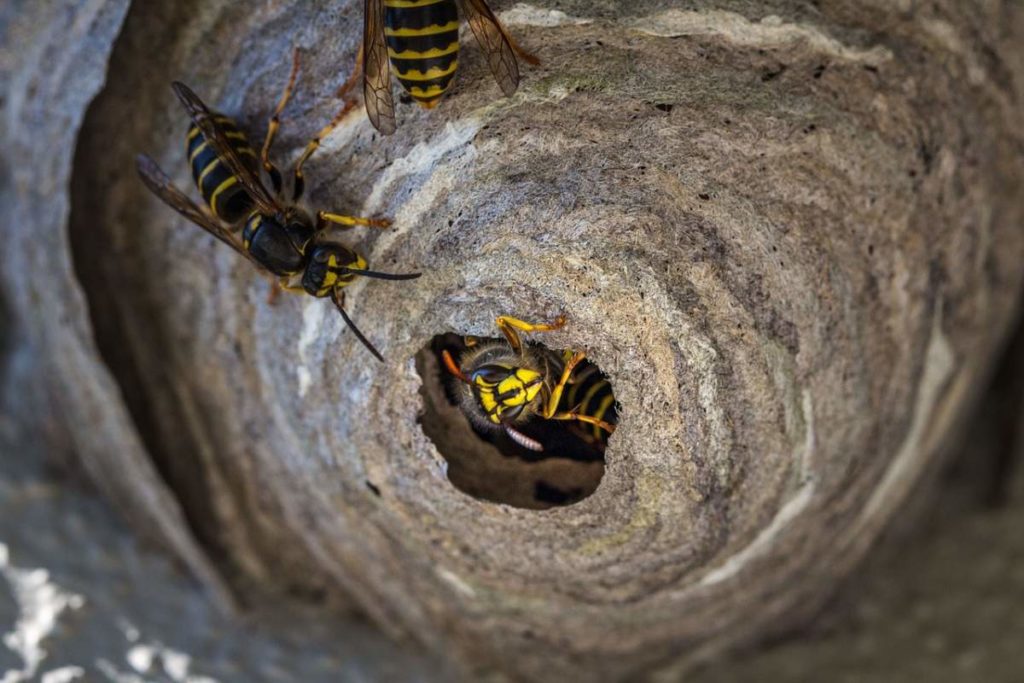How to Ged Rid of a Wasp Nest
As the days start to get longer and warmer, and you begin to look forward to Summer, you can be sure that one pest will soon be along to spoil the happy spring vibe…wasps!
It’s during Spring that the queens emerge from their winter hibernation. They will then hunt around for a suitable place to set up home for the summer. Some queens have been known to return to the same area year after years, but every year they build their nest from scratch.

Wasp Nest Building
The queen will look for a quiet, well-protected environment to build her nest. Ideally where she and her colony won’t be disturbed. Unfortunately, our homes and buildings, in general, make attractive real estate for your average queen wasp.
Loft’s, attics, garages and sheds are all easily accessible if you’re the size of a wasp. They typically have some nice hiding places, and many are rarely used. They also offer protection from the elements, making them an ideal spot for a developing colony. Lofts and attics, in particular, can be VERY attractive. Loft insulation provides a good hiding place for the queen building her nest.
Once the new nest is taking shape, the queen lays her first eggs. These eggs grow into the female worker wasps who will help manage the continued growth of the colony.
Now the queen focuses on growing the size of the colony. By mid-summer, the nest can grow to over 5000 individuals.
Getting Rid of a Wasp Nest
If you carry out a quick Google search, you will find lots of suggestions of how to get rid of a wasp nest yourself. We DO NOT advise you attempt any of these suggestions. They are all extremely dangerous and also ineffective at fully dealing with the problem.
Below we highlight some of the most frequently suggested ideas of how to get rid of a wasp nest and we explain why each is ineffective.
Setting the Nest on Fire: Waps nests are extremely flammable due to the materials they are constructed from. If you set fire to a wasp nest, there is a high chance the fire could catch hold very quickly and spread to your property.
Burning a nest doesn’t kill all the wasps. Large numbers are likely to escape, and many more will be away from the nest foraging. The remaining wasps will become violent and very dangerous.
Drowning a Nest: This solution has similar issues to fire. You would need to use a significant amount of water to drown a nest. This could lead to extensive property damage.
A large number of wasps will also escape or won’t be in the nest at the time of the drowning. You are likely to have hundreds to thousands of angry wasps looking for someone to attack.
Destroying the Nest: People online have suggested gardening tools, cricket bats, baseball bats and broom handles to knock down the nest and then destroy it. Whichever implement you use will require you to get close to the nest. This in itself is enough for the wasps to get defence and start attacking. Wasps, when threatened, can be very aggressive, and it’s likely any attempt to destroy their nest would be met with a strong and swift reaction.
Best Way to Get Rid of a Wasp Nest
We do not recommend any of the DIY methods of wasp nest removal. All of them are very dangerous and likely to result in personal injury.
If you have a wasp nest that needs removing, it’s much better to call a qualified professional who has the correct equipment and training to safely carry out wasp nest removal.
To effectively treat a nest, insecticidal dust should be sprayed directly inside. This will slightly agitate the wasps initially, but over the next few hours activity will lessen as the wasps die. The benefit of this type of treatment is that wasps that are returning to the nest from foraging will be exposed to the dust when they return.
This form of treatment is very effective and will deal with the colony in its entirety.
How to Get Rid of a Wasps Nest Summary
Wasps nests can be dangerous if they are in or near your property. Each nest can be home to 5000 individuals, and they don’t take kindly to having their nest disturbed or threatened. By far, the safest course of action is to call a pest control professional who has the knowledge, experience and equipment to safely carry out the job.
If you have any questions or would like to book an appointment with our pest control team, please get in touch.
